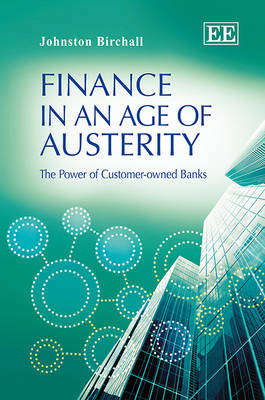
Finance in an Age of Austerity
The Power of Customer-owned Banks
Seiten
2013
Edward Elgar Publishing Ltd (Verlag)
978-1-78195-183-5 (ISBN)
Edward Elgar Publishing Ltd (Verlag)
978-1-78195-183-5 (ISBN)
It finds customer-owned banks – credit unions, co-operative banks, building societies – have hardly been affected by the crisis and continue to operate according to their organisational DNA: low-risk, close to the customer, underpinned by real savings, and still lending to SMEs to protect jobs and local economies.
This is a book in search of an alternative to the discredited investor-owned banks that have brought the rich countries into crisis and the world economy into a long period of austerity. It finds customer-owned banks - credit unions, co-operative banks, building societies - have hardly been affected by the crisis and continue to operate according to their organisational DNA: low-risk, close to the customer, underpinned by real savings, and still lending to SMEs to protect jobs and local economies. They are big business - in some countries with over 40% of the market - but networked in smaller, democratic societies whose origins go back to 1850s Germany.
The book explores their history and current situation, measures the impact of the banking crisis, makes a systematic study of their advantages, compares them to alternatives (savings banks and micro-finance institutions), and investigates their supervision and governance structures. It provides hard evidence for the superiority of customer-owned banks.
Finance in an Age of Austerity will appeal to public policy analysts and political commentators, academics and students interested in current issues concerning banking regulation, supervision and governance. Social commentators and campaigners concerned with providing an ethical alternative to casino capitalism and social economists wanting to develop a critique of the investor-owned banking system will also find this book invaluable. It will be essential reading for banking specialists interested in broadening their understanding of a hidden sector that, since the crisis, has become much more significant.
Contents:
1. Introduction
2. The Evolution of Cooperative Banks
3. The Evolution of Credit Unions
4. The Evolution of Mutual Building Societies
5. The Evolution of Banks Owned by Other Types of Cooperative
6. The Performance of Customer-owned Banks During the Crisis
7. The Comparative Advantages of Customer-owned Banks
8. Some Alternatives: Savings Banks and Micro-finance Institutions
9. Regulation, Governance and the Need for Member Participation
10. What Motivates Members to Participate?
11. Customer-owned Businesses - the Wider Picture
12. Conclusion: A Cooperative Counter-narrative
Appendix: A Note on Terminology
Bibliography
Index
This is a book in search of an alternative to the discredited investor-owned banks that have brought the rich countries into crisis and the world economy into a long period of austerity. It finds customer-owned banks - credit unions, co-operative banks, building societies - have hardly been affected by the crisis and continue to operate according to their organisational DNA: low-risk, close to the customer, underpinned by real savings, and still lending to SMEs to protect jobs and local economies. They are big business - in some countries with over 40% of the market - but networked in smaller, democratic societies whose origins go back to 1850s Germany.
The book explores their history and current situation, measures the impact of the banking crisis, makes a systematic study of their advantages, compares them to alternatives (savings banks and micro-finance institutions), and investigates their supervision and governance structures. It provides hard evidence for the superiority of customer-owned banks.
Finance in an Age of Austerity will appeal to public policy analysts and political commentators, academics and students interested in current issues concerning banking regulation, supervision and governance. Social commentators and campaigners concerned with providing an ethical alternative to casino capitalism and social economists wanting to develop a critique of the investor-owned banking system will also find this book invaluable. It will be essential reading for banking specialists interested in broadening their understanding of a hidden sector that, since the crisis, has become much more significant.
Contents:
1. Introduction
2. The Evolution of Cooperative Banks
3. The Evolution of Credit Unions
4. The Evolution of Mutual Building Societies
5. The Evolution of Banks Owned by Other Types of Cooperative
6. The Performance of Customer-owned Banks During the Crisis
7. The Comparative Advantages of Customer-owned Banks
8. Some Alternatives: Savings Banks and Micro-finance Institutions
9. Regulation, Governance and the Need for Member Participation
10. What Motivates Members to Participate?
11. Customer-owned Businesses - the Wider Picture
12. Conclusion: A Cooperative Counter-narrative
Appendix: A Note on Terminology
Bibliography
Index
The late Johnston Birchall, formerly Professor of Social Policy, Stirling University, UK
Contents: 1. Introduction 2. The Evolution of Cooperative Banks 3. The Evolution of Credit Unions 4. The Evolution of Mutual Building Societies 5. The Evolution of Banks Owned by Other Types of Cooperative 6. The Performance of Customer-owned Banks During the Crisis 7. The Comparative Advantages of Customer-owned Banks 8. Some Alternatives: Savings Banks and Micro-finance Institutions 9. Regulation, Governance and the Need for Member Participation 10. What Motivates Members to Participate? 11. Customer-owned Businesses – the Wider Picture 12. Conclusion: A Cooperative Counter-narrative Appendix: A Note on Terminology Bibliography Index
| Erscheint lt. Verlag | 30.4.2013 |
|---|---|
| Verlagsort | Cheltenham |
| Sprache | englisch |
| Maße | 156 x 234 mm |
| Themenwelt | Wirtschaft ► Betriebswirtschaft / Management ► Finanzierung |
| Betriebswirtschaft / Management ► Spezielle Betriebswirtschaftslehre ► Bankbetriebslehre | |
| Wirtschaft ► Betriebswirtschaft / Management ► Unternehmensführung / Management | |
| ISBN-10 | 1-78195-183-7 / 1781951837 |
| ISBN-13 | 978-1-78195-183-5 / 9781781951835 |
| Zustand | Neuware |
| Haben Sie eine Frage zum Produkt? |
Mehr entdecken
aus dem Bereich
aus dem Bereich
denken und handeln wie ein professioneller Trader
Buch | Softcover (2023)
Vahlen, Franz (Verlag)
36,90 €


